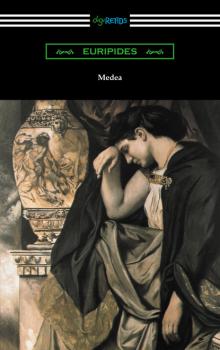ТОП просматриваемых книг сайта:
Euripides
Список книг автора EuripidesАннотация
Euripides turned to playwriting at a young age, achieving his first victory in the Athens’ City Dionysia dramatic competitions in 441 BC. He would be awarded this honor three more times in his life, and once more posthumously. His plays are often ironic, pessimistic, and display radical rejection of classical decorum and rules. In 408 BC, Euripides left war-torn Athens for Macedonia, upon the invitation of King Archelaus, and there he spent his last years as a confidant of the king. In his final years, he produced “The Bacchae”, which in modern times has become one of the most frequently preformed plays from classical antiquity. Winner of the first prize of the Athens’ City Dionysia dramatic competition, the play is a tragedy based on the Greek myth of King Pentheus of Thebes and his mother Agave. When Dionysus appears at the palace of Thebes to attest that he is the son of Zeus, the sisters of his mortal mother, Semele, do not believe him. He proceeds to establish a cult of followers in Thebes and exact vengeance on all those who deny his godly status. Considered one of the greatest of all dramas from classical antiquity, this play’s popularity and critical acclaim stands as a testament to the profound dramatic talent of Euripides. This edition includes a biographical afterword.
Аннотация
The influence of Euripides on the development of the dramatic genre cannot be overstated. Along with Sophocles and Aeschylus he is regarded as one of the three great Greek tragedians from classical antiquity. One of the most important of Euripides’ surviving dramas is “Medea”, the story of its title character, the wife of Jason of the Argonauts, who seeks revenge upon her unfaithful husband when he abandons her for a another bride. Set in Corinth sometime after Jason’s quest for the Golden Fleece, the play begins with Medea raging against her husband’s plans to marry Glauce, daughter of Creon, King of Corinth. Jason tries to explain his intent to marry Glauce as an effort to improve his status and that afterwards he intends to unify the two families taking Medea as his mistress. Medea however is unconvinced and pursues a path of murderous revenge. The play is controversial for its depiction of Medea murdering her own children as part of her revenge. This depiction was unconventional and not well received with the contemporary Athenian audience who expected the more traditional depiction of Medea’s children being killed by the Corinthians after her escape. Regardless of this unfavorable initial reaction, “Medea” has come to be regarded as one of the most important tragedies of classical antiquity. This edition is translated with an introduction and annotations by Gilbert Murray and includes a biographical afterword.
Аннотация
These two powerful classics of ancient drama are excellent examples of the author's gift for adapting traditional material for decidedly nontraditional effect. Through them Euripides critically examines social and moral aspects of contemporary life and even specific political events. He endows his figures with shrewdly observed individual character, implicitly deflating the emblematic simplicity of traditional narratives and making him seem the most modern of the great Greek dramatists.The Trojan Women, one of the most powerful indictments of war and the arrogance of power ever written, is played out before the ruined walls of Troy. A grim recounting of the murder of the innocent, the desecration of shrines, and the enslavement of the women of the defeated city, it reveals the futility of a war fought for essentially frivolous reasons, in which the traditional heroes are shown to be little better than bloodthirsty thugs. Hippolytus is primarily about the dangers of passion and immoderation, whether in pursuing or in thwarting normal desires — struggles symbolized by the gods, who embody natural forces and behave like irresponsible humans.Required study for any college course in literature and mythology, these two masterpieces are essential reading for anyone interested in the roots of world drama.
Информация о книге
Автор произведения Euripides
Жанр Античная литература
Серия Dover Thrift Editions
Аннотация
One of the most powerful and enduring of Greek tragedies, Medea centers on the myth of Jason, leader of the Argonauts, who has won the dragon-guarded treasure of the Golden Fleece with the help of the sorceress Medea. Having married Medea and fathered her two children, Jason abandons her for a more favorable match, never suspecting the terrible revenge she will take. Euripides' masterly portrayal of the motives fiercely driving Medea's pursuit of vengeance for her husband's insult and betrayal has held theater audiences spellbound for more than twenty centuries. Rex Warner's authoritative translation brings this great classic of world literature vividly to life.
Информация о книге
Автор произведения Euripides
Жанр Античная литература
Серия Dover Thrift Editions
Аннотация
This remarkably low-priced anthology brings together five of the greatest, most studied, and most performed Greek tragedies, each in an outstanding translation:• Oedipus Rex and Electra by Sophocles (translated by George Young), in which the much-admired playwright explores the individual's search for truth and self-knowledge• Medea and Bacchae by Euripides (translated by Henry Hart Milman), favorites with modern audiences for their psychological subtlety and the humanity of their characters• Prometheus Bound by Aeschylus (translated by George Thomson), a monumental work that examines relations between humans and the godsThese masterpieces of world literature represent the very apex of Greek drama and are essential for both the home library and the classroom.
Информация о книге
Автор произведения Euripides
Жанр Старинная литература: прочее
Серия Dover Thrift Editions
Аннотация
Though little is known for certain of his early life, Euripides was probably born around 460 b.c.e. to the farmer Mnesarchus and his wife Clito, and his studious nature quickly led him to a literary life in Athens. Euripides turned to playwriting at a young age, achieving his first victory in the dramatic competitions of the Athenian City Dionysia in 441 b.c.e. He would be awarded this honor three more times in his life, and once more posthumously. His plays are often ironic, pessimistic, and display radical rejection of classical decorum and rules. Together with Aeschylus and Sophocles, Euripides would provide the canon of Greek tragedy and thereby lay the foundation of Western theatre. «Rhesus» takes place during the Trojan War, and, as in book 10 of Homer's «Iliad», depicts the night when Odysseus and Diomedes sneak into the Trojan camp. There has been some debate as to the authorship of «Rhesus», but modern scholars believe Euripides to be the correct author.
Аннотация
Though little is known for certain of his early life, Euripides was probably born around 460 b.c.e. to the farmer Mnesarchus and his wife Clito, and his studious nature quickly led him to a literary life in Athens. He turned to playwriting at a young age, achieving his first of five victories in the dramatic competitions of the Athenian City Dionysia in 441 b.c.e. His plays are often ironic, pessimistic, and display radical rejection of classical decorum and rules. Together with Aeschylus and Sophocles, Euripides provided the canon of Greek tragedy and thereby laid the foundation of Western theatre. «Helen» is a drama which follows an alternative myth of Helen of Sparta after the fall of Troy. It begins with the premise that Helen did not run off to Troy with Paris, but was actually stolen away to Egypt by the gods and replaced by a phantom look-alike in Troy.
Аннотация
Euripides, along was Sophocles and Aeschylus, is responsible for the rise of Greek tragedy. It was in the 5th Century BC, during the height of Greece's cultural bloom, that Euripides lived and worked. Of his roughly ninety-two plays, only seventeen tragedies survive. Both ridiculed and lauded during his life, Euripides now stands as an innovator of the Greek drama. Here, in «Iphigenia Among the Taurians» is an escape play with a familiar cast of characters. Iphigenia, Orestes, and Pylades all appear at the Black Sea in a fascinating drama about ritual and sacrifice among the cult of Artemis. «Iphigenia» is difficult to categorize as it deftly moves from romance to comedy to tragedy. Considered by many classicists to be Euripides most well executed play, «Iphigenia» displays the deeply philosophical leanings absent in many of his other plays.
Аннотация
Euripides (480 BC-406 BC) is revered as one of the three great tragedians of classical Athens, along with Aeschylus and Sophocles, and produced the largest body of extant work by any ancient playwright. He is considered to be the most modern of the three, and he laid the foundation for Western theatre. His work sticks out from that of his contemporaries because of his colloquial vocabulary, meter and syntax, distinct from the grandiose language of his predecessors. This edition contains six of Euripides' eighteen surviving works, including «Orestes». In writing «Orestes» (408 b.c.e.), Euripides utilized the mythology of the Bronze Age to reflect upon the politics of Athens during the Peloponnesian War. The story takes places after Orestes has murdered his mother to avenge his father, Agamemnon, and follows him as he attempts to save his own life. The play explores themes of man's subordination to the gods and the conflict between natural law and manmade law. In addition to «Orestes» this edition also includes «The Heracleidae», «Andromache», «The Suppliants», « The Phoenician Maidens», and «Iphigenia at Aulis».
Аннотация
Euripides turned to playwriting at a young age, achieving his first victory in the dramatic competitions of the Athenian City Dionysia in 441 b.c.e. He would be awarded this honor three more times in his life, and once more posthumously. His plays are often ironic, pessimistic, and display radical rejection of classical decorum and rules. In 408 b.c.e., Euripides left worn-torn Athens for Macedonia, upon the invitation of King Archelaus, and there he spent his last years as a confidant of the king. This edition contains four of the eighteen extant works by this renowned Greek dramatist. In his final years, he produced «The Bacchae» – one of the most produced ancient plays of the twentieth century. Produced by his son or nephew in 405 b.c.e., after his death, «The Bacchae» was part of a trilogy that won first place at the Athens City Dionysia. In addition to «The Bacchae» this edition includes «Ion», «The Trojan Women» and «Helen».










